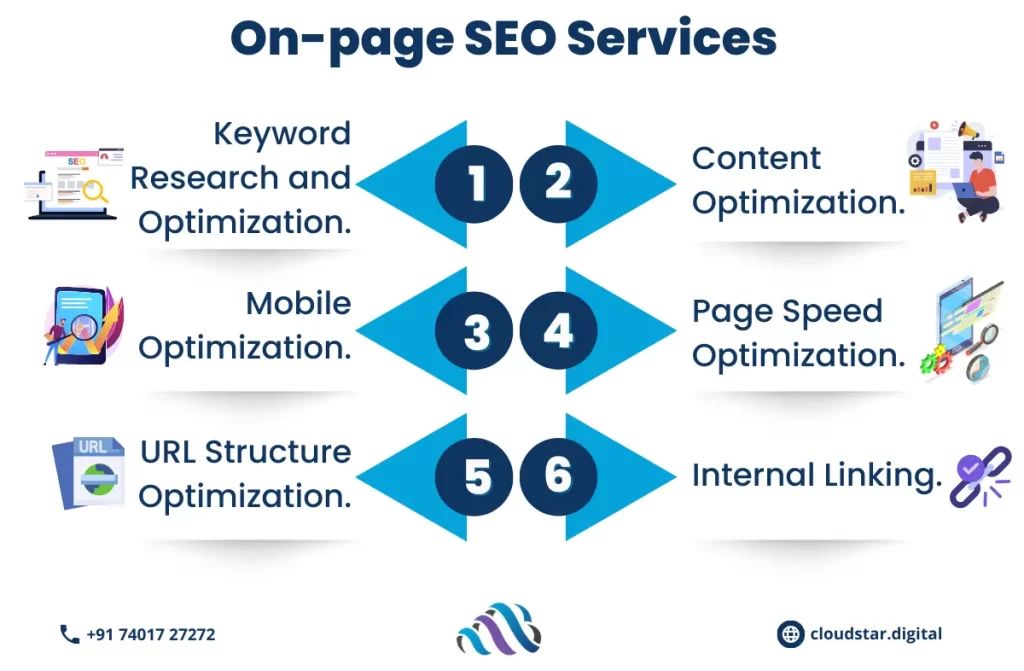In recent days, Search Engine Optimization (SEO) has had a significant role as it helps organizations target new audiences, drive traffic to their websites, spread vast knowledge, and drive growth. Over time, it became a technical practice to inform about web users’ behavior. They use both on-page SEO services and off-page optimization techniques to ensure high-quality websites will make it to the top of search engine result pages.
But what are on-page SEO and off-page SEO optimization, and how do digital marketers make use of them to serve their company or clients? That’s exactly what this article will help you learn everything you need to know about modern SEO best practices.
What is On-Page SEO Services?
On-Page SEO (Search Engine Optimization) services refer to the practices and strategies used to optimize individual web pages on a website to improve their search engine rankings and overall visibility in search engine results pages (SERPs). On-Page SEO focuses on optimizing various elements within a web page to make it more attractive and relevant to search engines, which can lead to higher organic (unpaid) search traffic.

Factors of On-Page SEO
There are many technical aspects of a webpage used for on-page SEO optimization to increase your page ranking. Some of them include the following:
- Title Tags – These are the HTML codes that enable you to designate a name or title of a webpage. It usually appears in the SERPs and browser bar. Making title tags are of the most important on-page SEO services after your actual page content. So, ensure to choose words wisely with 60 characters or less.
- Meta Descriptions – It is a brief summary which is about 155 – 160 characters of web page content. This is included in on-page SEO services to show up as part of a SERP snippet and below a headline in a social post to aid users to understand how your content is relevant depending on their search query, besides encouraging clicks.
- URL Structure – An organized URL structure will allow search engines to easily crawl from page to page on your website as well as makes navigation more efficient for visitors. It contains keywords that reflect on pages that can be easy to understand and are more likely to earn clicks. URLs in the on-page SEO services should be relatively short. So, use the primary keyword for that page and avoid redundant words.
- Headings – The titles should be in H1 format to get the best On-page SEO optimization results. Headings are focused on relevant and descriptive words where you have to optimize them with keywords. In order to break up content, use subheadings (H2 – H6) following the same best practices, but don’t repeat phrases or keywords throughout a post.
- Alt Text for Images –This is a brief written description of an image appearing on a web page. In the event, that an image doesn’t load properly, alt text populates the space so users will get to know what they’re missing. It should be specific with 125 characters or less. For on-page SEO services, alt text allows search engines to better crawl and rank websites.
- Site Speed – Page load speed is vital because slow-loading pages have high bounce rates. Ensure fast page load speed and if you are not aware of how your site ranks, try to test and benchmark your page speed.
- Internal Links – These are navigational aids that inform the visitors of the website where they are on your site, and also help Google to understand and convey the index of your pages in high rank in the search results. Typically, for on-page SEO services, each page on your website should link back to its category or subcategory page and homepage.
- Responsiveness – Responsiveness ensures your page will display properly on any device, including mobiles and desktops. This will continue to be an important factor in on-page SEO services when countless people around the world use mobile devices for online searches.
- Keywords – In on-page SEO services, keywords play a major role in on-page strategy because they can be incorporated into all the technical elements to help exemplary visitors find you at the right time. To be more effective, keywords must be researched and carefully selected, and worked into content in a natural way.
What is Off-Page SEO Services?
In general, off-page SEO works to boost website popularity and, by extension improves the SERP positioning that on-page SEO services in Chennai initially made visibility possible.
This all happens as a result of certain ranking factors leveraging opportunities that are separate from but funnel back to your website. There can be less influence over performance as compared to on-page SEO optimization, but it doesn’t make off-page SEO less valuable.
Factors of Off-Page SEO
The factors of off-page SEO include the following:
- Link Building – To generate natural links to your page where users can easily navigate to other information which they find relevant.
- Blogging – It is an excellent way to generate linkable content for your brand where it is easy for your audience to comment on and share your content.
- Social Media Marketing – It creates awareness of your brand where you can generate content that is relevant and easy to read.
- Influencer Marketing – Boost ranking so that people can find, contact and make a purchase from you. It creates positive engagement with your brand through links, social media, reviews, or brand mentions.
- Writing for Publications – It gives you a huge potential for attracting customers who might not have heard of you. Also, it gives you a portfolio of writing that you can show to other publications to start writing for them, and much more.
- Social Bookmarking – It is the process of submitting your content to sites like Tumblr, Reddit, StumbleUpon, and others to offer actual value to your content.
Why Is Off-Page SEO Important?
Off-page SEO holds significance for several reasons:
Authority and Trust: Quality backlinks from reputable sites signal to search engines that your site is trustworthy and authoritative.
Improved Rankings: Backlinks and brand mentions from authoritative sites can positively impact search engine rankings, boosting visibility.
Increased Website Traffic: Higher rankings and visibility lead to more clicks and organic traffic to your website.
Brand Exposure and Awareness: Off-page SEO efforts, like guest blogging or social media engagement, expose your brand to a wider audience, enhancing brand recognition.
Referral Traffic: Quality backlinks serve as pathways for referral traffic from other websites, potentially bringing in interested visitors.
Long-Term Benefits: Quality off-page SEO creates a strong foundation for sustainable online presence and growth.
Difference between On-Page and Off-Page SEO
You should target a search term using keyword research, create a page and tweak the content for optimized results in on-page SEO. Besides that, you can have full control over your optimization efforts for on-page SEO services.
On the other hand, off-page SEO is quite different where it trusts the promotion more. These activities include blogging, link building, social media marketing, and other off-page optimization methods to create awareness. The control is usually in the hands of your community.
Link Building Strategy of SEO competitive analysis
Backlinks are a significant variable in Web optimization and a urgent piece of competitor analysis. Then How to do an SEO Competitive Analysis through link building strategy. Here are a few tips by analyzing your competitors’ link profiles, you can identify opportunities for building high-quality backlinks.
This incorporates understanding the quality and amount of your competitors’ backlinks and recognizing locales that might connection to your own website.
Tools like Ahrefs and Moz Link Explorer can provide valuable insights into your competitors’ link profiles and help you identify opportunities for improvement.
What is Technical SEO?
Need to know What is Technical SEO then it is the process of optimizing the technical aspects of a website to enhance its ranking and visibility in search results. This includes optimizing website architecture, making sure the website is crawlable and indexable, improving site speed, and resolving duplicate content issues.
Conclusion
To sum up, both on-page and off-page optimization work together in order to improve your website rankings in search engines. But the most vital thing is that you need to focus on-page optimization before concentrating more on the off-page method.
If you need any advice regarding on-page SEO services or off-page SEO services, you can ask the experts of a leading SEO company like Cloudstar Digital (Contact no: 7401727272) to help you with all kinds of the latest techniques and Google’s updates to highlight your brand and your website.
Read also: SEO for Hospitals and Healthcare


